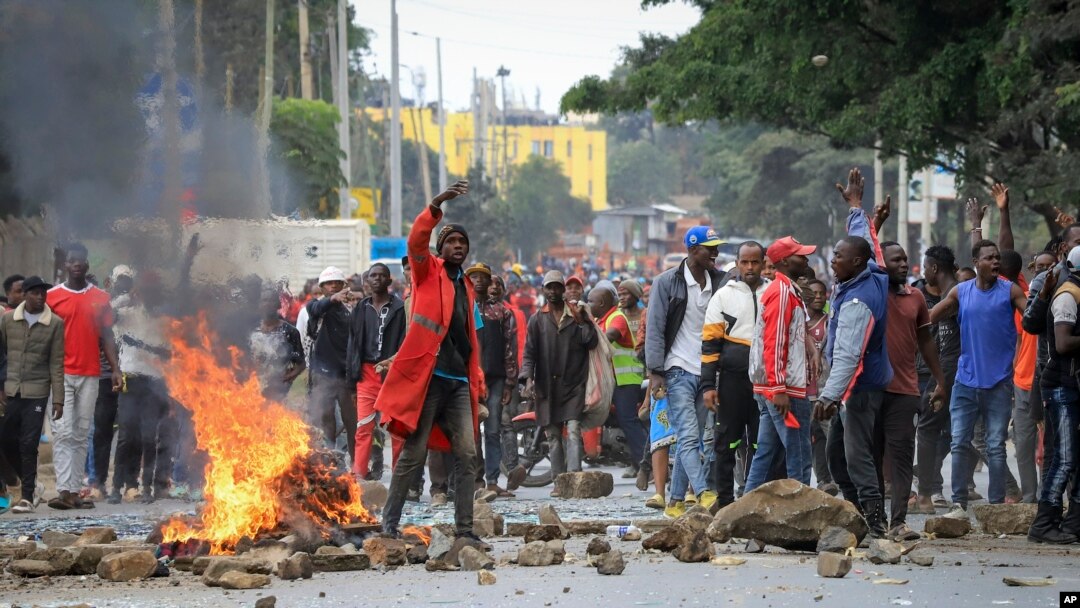Opposition leader Raila Odinga's Azimio alliance said it would stage another demonstration next Wednesday, vowing to keep up the street action until economic pressures ease
After the violence, interior minister Kithure Kindiki issued a warning that the authorities would no longer tolerate the unrest.
"Lives have been lost, scores of law enforcement officers and civilians have been grievously injured and unimaginable loss to the country's economy has been occasioned," he said in a statement condemning "widespread violence, looting and destruction of private and public property."
"This culture of impunity will stop," he vowed, adding that 312 people "who directly or indirectly planned, orchestrated, or financed" the protests had been arrested and would be charged, including a member of parliament who was later released.
The unrest has claimed nine lives, according to the Kenya National Commission on Human Rights, an independent watchdog created by parliament, which said the figures were shared by the police.
"It is essential for leaders across the political spectrum to prioritise the interests of the nation and its citizens over partisan interests," the commission said.
The Independent Policing Oversight Authority, Kenya's police watchdog, announced a probe into "reported fatalities resulting from gunshot injuries" as well as other incidents involving casualties or damage to property.
"We have three deaths in Mlolongo, where a group of demonstrators had blocked the road to protest, and we also have two others in Kitengela and one in Emali," a police officer said.
"There was a confrontation with police officers deployed to quell the riots and some (people) ... were shot in the process," he said on condition of anonymity.
A second policeman said: "I can confirm the deaths in Mlolongo, Emali and Kitengela," without elaborating further.
In Nairobi's Kangemi slum, dozens of children were hospitalized, some unconscious, after teargas was fired near their classrooms, the head of the clinic told AFP.
"We took 53 of them to the hospital and they are all now in a stable condition awaiting discharge," he said.
Opposition leader Raila Odinga, pursuing a protest campaign against the government, had urged demonstrations against a tax law that has seen fuel prices surge, adding to the difficulties faced by poor Kenyans.
But late Tuesday, police chief Japhet Koome said the authorities had not received any official notification of rallies, as required by law.
"All lawful means will be used to disperse such demonstrations," he warned.
Major roads in several western cities where Odinga commands significant support were deserted as protesters took to the streets.
'Bullets and tear gas'
The clashes followed rallies in several cities last week saw six people killed, according to the interior ministry.
Rights campaigners and opposition politicians accused police of being heavy-handed.
"We have always said that these meetings remain peaceful until police decide to break them up with bullets and tear gas," Odinga said on Wednesday.
"Police have shot, injured and killed protesters in various parts of the country including here in Nairobi."
But he said he was calling off plans to address supporters in the capital, citing fears for their safety.
The ban follows protests last Friday, when police fired tear gas in Nairobi, targeting Odinga's convoy, AFP journalists reported.
They took similar steps against demonstrations in the cities of Mombasa and Kisumu.
On Saturday, campaigners said police used tear gas on civil society representatives demanding the release of dozens of people arrested during the protests.
Along with rights groups including Amnesty International, the Kenya National Commission on Human Rights has called for an investigation into all reported incidents of police brutality, warning Kenya was "teetering on the brink of anarchy."


